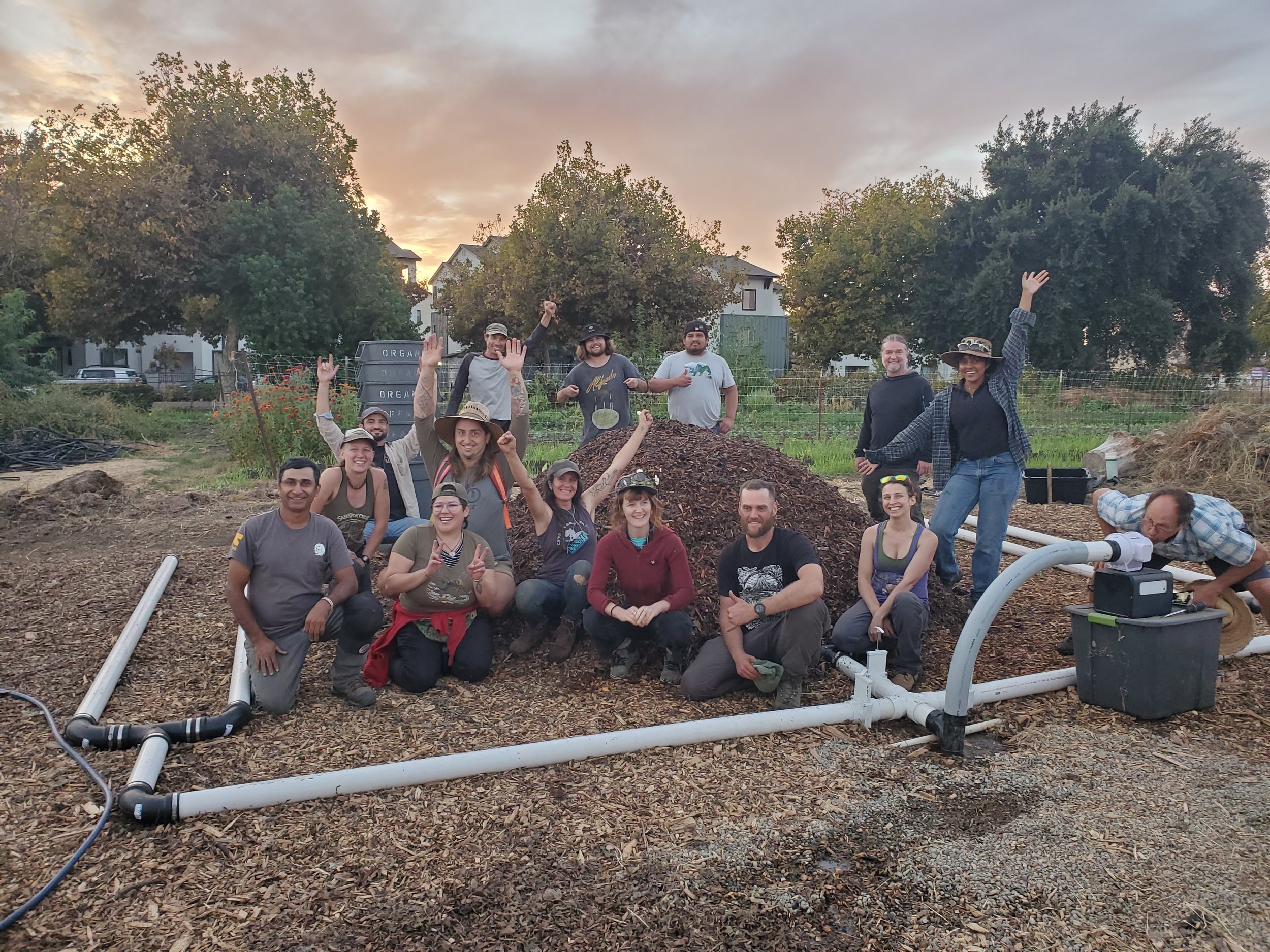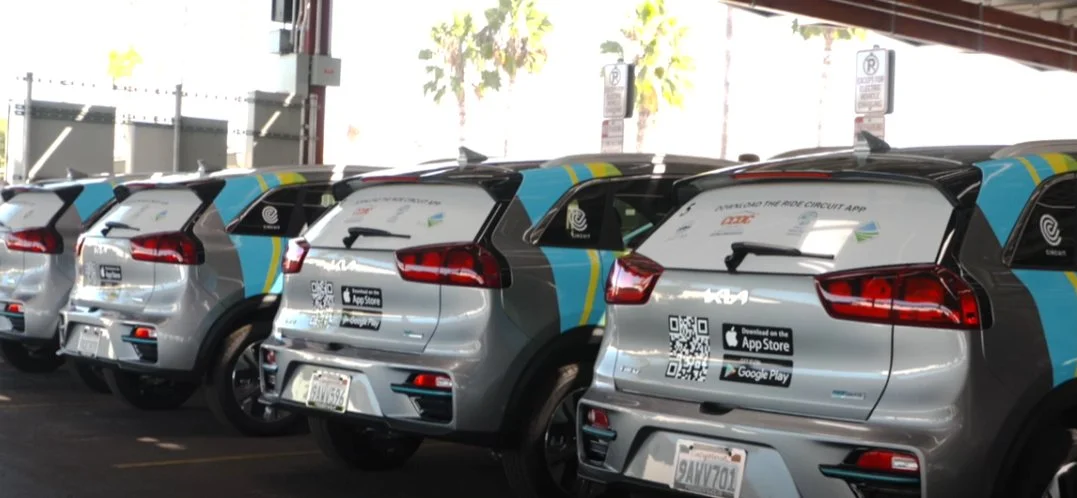California Department of Resources Recycling and Recovery’s (CalRecycle) Community Composting for Green Spaces Grant Program is funding community composting at hundreds of sites across California. In the first cycle of funding, the grant program awarded $1.5 million to the People, Food, and Land Foundation, which supported community composting at 117 sites throughout California, planted 488 trees, created 4,418 cubic yards of compost, and reduced emissions by 2,508 MTCO2e of GHG emissions. An additional $4.2 million was awarded to the California Alliance for Community Composting and LA Compost in the second cycle of the program. Through the establishment or expansion of community composting sites, communities receive benefits such as part time jobs and training on composting practices, fresh produce from adjacent gardens, training on farming practices, an increase in shade from tree planting, and the development of green spaces.
Realizing Carshare Benefits in Priority Populations
Since 2015, the City of Los Angeles (LA), in partnership with the LA Department of Transportation and the Mayor’s Office, has received a total of $4.7 million from CARB’s Clean Mobility Options program for a zero‑emission car share pilot project. This project, known as BlueLA, is operating in 13 underserved communities that face significant air quality burdens and have historically been excluded from environmental benefits. BlueLA provides a clean and affordable mobility option in these communities, which include Downtown, Pico Union, West Lake, and Koreatown.
Revitalizing Rural and City Transit: Electric Buses arrive in Merced County
In the heart of the San Joaquin Valley, a transformative project is underway to reshape public transportation in communities around Merced. Thanks to $3.1 million in funding from the California State Transportation Agency's Transit and Intercity Rail Capital Program (TIRCP)—half from California Climate Investments and half from SB 1 funds—the Transit Joint Powers for Merced County initiative addresses critical transit needs in disadvantaged communities. The initiative improves air quality and spurs economic growth by adding battery‑electric buses into The Bus, Merced County’s public transit system.
Improving Sacramento Valley Soil Health with Winter Cover Crop Species
In 2020, Sarah Light, agronomy advisor at the University of California Cooperative Extension, partnered with the Colusa County Resource Conservation District, Davis Ranch, Richter Ag, and the United States Department of Agriculture Natural Resource Conservation Service to apply for a CDFA Healthy Soils Program Demonstration Grant. The team received $99,832 of grant funding to conduct a demonstration project on cover crops on two fields in the Sacramento Valley from fall 2020 to spring 2024.
Improving Forest Health in the Yurok Community Forest and Salmon Sanctuary
Zero-Emission Transit Vehicles, New Bike Lanes, and Shade Trees In Commerce
California Air Resources Board
Thanks to over $3 million from the Sustainable Transportation Equity Project, the City of Commerce has partnered with Climate Resolve and TreePeople to provide more clean transportation options to the city’s residents. Situated in southeast Los Angeles County in an area known for its commercial and industrial operations, Commerce has a history of providing free and reliable public transit service to its residents.
Saving San Diego's Last Mixed Conifer Forest
California Department of Forestry and Fire Protection
A collaborative of landowners led by the San Diego Fire Safe Council and the Resource Conservation District of Greater San Diego County is implementing a landscape-scale restoration project aimed at improving forest health on Palomar Mountain. Forests in San Diego county have experienced heavy losses from catastrophic fires and invasive pest infestations. Now at the home of one of San Diego county’s last mixed conifer forests, project partners are working to ensure Palomar Mountain’s forests are resilient to future wildfires.
New Affordable Housing Opens at Riverside's Mission Heritage Plaza
California Strategic Growth Council
72 affordable homes for families and veterans are now available in downtown Riverside. The Mission Heritage Plaza project is a partnership between Wakeland Housing and Development Corporation, the City of Riverside, and Riverside Transit Agency, working to reduce greenhouse gas emissions through transportation mode-shift and construction of affordable housing within the urban core of Riverside.
City of Chula Vista Launches New On-Demand Community Shuttle
Forest Health in San Mateo County – A Collaborative Approach
California Department of Forestry and Fire Protection
A $2.5 million grant from CAL FIRE’s Forest Health Program is supporting the San Mateo Resource Conservation District (RCD) and a network of regional partners in their efforts to improve forest resilience, increase carbon sequestration, and reduce wildfire risk to vulnerable communities in the Santa Cruz Mountains.
Supporting Adaptation and Resilience Planning in the City of Morro Bay
Using a $65,000 grant awarded under the Coastal Resilience Planning program, the City of Morro Bay engaged with its community to update the City’s Land Use Plan, the first step to updating its Local Coastal Program to include updated adaptation strategies and land use policies that will protect coastal infrastructure and provide resilience to future coastal hazards.
Providing Clean Drinking Water to an Elementary School in Manteca
California State Water Resources Control Board
Thanks in part to a $21,253 technical assistance grant from the State Water Resources Control Board’s Safe and Affordable Drinking Water Fund, the City of Manteca will be able to provide safe water for Nile Garden Elementary School by consolidating the school into the City of Manteca’s public water system.
Partnership Helps Protect San Diego County Forests
The Resource Conservation District of Greater San Diego County (RCD) is using their $1.4 million grant awarded in 2019 from the Regional Forest and Fire Capacity program to develop the region’s capacity to restore the health of its forests and protect them from severe wildfires in the future. To carry out this work, the RCD has partnered with several California Native American Tribes, the Cleveland National Forest, a private cattle company, and the Palomar Observatory to manage the region, which includes the last mixed conifer forest in San Diego County. The RCD is also developing training programs for several Fire Safe Councils in San Diego County serving 46 communities, so they can support this work.
Santa Barbara Cool Blocks Project Inspires Community Climate Action
In 2021, the Santa Barbara County Association of Governments completed the Cool Blocks Try Transit project, a neighborhood outreach and capacity building campaign supported by a $25,000 grant from the Low Carbon Transit Operations Program and in partnership with the Empowerment Institute’s Cool Blocks program. This project brought the participating 25-block neighborhood of Isla Vista together over a series of workshops to learn about and consider climate change mitigation and resilience measures they could adopt as individuals and as a community, which included using public transit. The project inspired the community to act, which in part led to their successful application to the Sustainable Transportation Equity Project, another California Climate Investments program.
Cleaner Passenger Trains through the Capitol Corridor Rail Project
In 2019, the Capitol Corridor Joint Powers Authority, in partnership with California Department of Transportation’s Division of Mass Transit, was selected by the Bay Area Air Quality Management District to receive $7.4 million from the Community Air Protection program to help replace two diesel-powered locomotives with two new Siemens Charger Tier 4 locomotives. These locomotives are now operating on the Capitol Corridor line from Auburn-Sacramento to Silicon Valley and run through disadvantaged and low-income communities in San Francisco, Oakland, Berkeley, and more. The new locomotives achieve a 90 percent reduction in particulate matter emissions and an 80 percent reduction in oxides of nitrogen emissions compared to the old, higher-polluting locomotives.
Turtle Rock Biomass Collection Site Helps Reduce Wildfire Severity
Alpine County was awarded $120,810 from the Fire Prevention Grants program to support the operation of The Turtle Rock Park Biomass Collection site. The facility provides communities in eastern Alpine County with a place to send green waste and biomass removed while creating defensible space around their properties to reduce the risk of future wildfire damage. By reducing the intensity of future wildfires, defensible space practices also reduce the emission of air pollutants and greenhouse gases.
Coyote Valley Prime Farmland Preserved in Perpetuity
Thanks to a $780,000 grant provided by the Sustainable Agricultural Lands Conservation (SALC) program, the Santa Clara Valley Open Space Authority (the Authority), in partnership with the Santa Clara Valley Transportation Authority and the Santa Clara County Planning Department, were able to purchase a 60-acre farm located in the Coyote Valley of Santa Clara County. This purchase adds to Coyote Valley’s growing network of protected lands and helps combat climate change by protecting prime farmland from being converted to more carbon-intensive land uses. This purchase also furthers the implementation of the comprehensive Santa Clara Valley Agricultural Plan finalized in January 2018, which Andrea Mackenzie, General Manager of the Authority defined as “a roadmap to protecting the multiple benefits that our region’s remaining farmlands and working lands provide.” This plan was also made possible by an award from the SALC program.
Expanding Capacity at the Turtle Rock Park Biomass Collection Site
The project is a continuation of the Turtle Rock Park Biomass Collection site which serves communities in eastern Alpine County. The facility provides a location to collect green waste and biomass that is cleared from private property to create defensible space and thereby reduce wildland fire risk.
Electric School Buses Benefit Students and Air Quality in Sacramento County
Zero-Emission Technology at Ports Provide Cleaner Air for Vulnerable Residents
The adjacent ports of Long Beach and Los Angeles combined are the largest fixed sources of air pollution in the South Coast Air Basin, one of the most polluted air basins in the United States, in large part because the trucks and equipment used at the ports burn diesel fuel. Recognizing this, the Sustainable Terminals Accelerating Regional Transformation demonstration project was awarded $50 million to replace trucks and equipment with zero‑emission technology. The funding, which comes from California Climate Investments, supports the deployment of 102 pieces of zero‑emission terminal equipment and trucks at seaports across California, including at the ports of Los Angeles and Long Beach. These funds are also supporting the development of new, cleaner tugboats; the deployment of two container vessels with cleaner‑burning engines; and advanced workforce development programs to support sustainable goods movement across California.






















